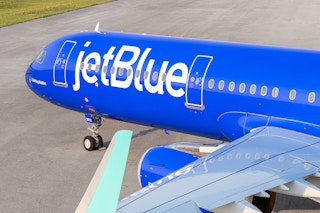Flights are expensive these days, so knowing how to find cheap flights is more important than ever. How do you avoid the headache of overpaying for airfare? Luckily, there are ways to score cheap flights every time you book. Here we share some of the best flight deals right now, walk you through where and when to book your flight, and tell you how to rack up the most savings on plane tickets (and even score flights for free).
Whether you’re flying with Southwest Airlines, JetBlue, American Airlines , or a budget airline like Frontier , use these tips for how to find cheap flights.
For more travel tips and shopping hacks, text HACKS to 57299 , or download the KCL app .
What's on this page:
- 1. Always check prices directly with the airline first, then check other booking sites.
- 2. Find cheap flights using Google Flights with a price guarantee.
- 3. There isn’t really a best day or time of the week to book your plane tickets.
- 4. Book a domestic flight early — up to 3 months early (or at least 30 days).
- 5. Aim to fly on Tuesdays and Wednesdays for the cheapest prices, and avoid flying on Sundays.
- 6. Consider booking with a budget airline for an all-around cheap flight.
- 7. Black Friday and Cyber Monday are two of the best times to score cheap flights.
- 8. Book cheap (and even free) flights with a travel reward credit card.
- 9. Sign up for free airline rewards programs to earn points or miles toward flights.
- 14. Save even more on your flight when you pay with a discounted gift card.
1. Always check prices directly with the airline first, then check other booking sites.
It’s easy and convenient to compare prices across airlines on sites like Orbitz and Expedia when you’re researching how to find cheap flights. But these days, you’re more likely to find cheap flights directly with the airline.
For one, lots of airlines have things called “low fare calendars” (like the Southwest Low Fare Calendar) on their websites. These calendars show you ticket prices for each day of the month based on your departure and destination. That way, you can see when prices are the lowest and highest and plan your trip accordingly.
Some airlines even promise you the best prices when you book directly with them, like JetBlue’s Best Fare Guarantee. If you find cheaper tickets anywhere else on the web within 24 hours, you can cancel your flight and receive a full refund.
2. Find cheap flights using Google Flights with a price guarantee.
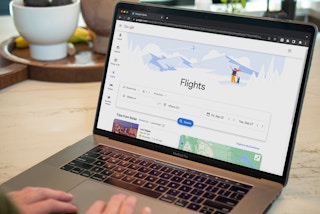
Google Flights has a pilot program for price guarantees on certain flights. Any flights covered under this guarantee will have a price guarantee badge next to them. When you see this badge, it means Google believes the price of your flight won’t drop before departure. If the price does drop, Google will refund you the difference via Google Pay after your flight takes off. This feature is currently only available for "Book on Google" itineraries departing from the U.S.
KCL TIP: Google Search also has travel features that can help you find hotels and things to do during your vacay.
3. There isn’t really a best day or time of the week to book your plane tickets.
It used to be that Mondays were considered the best day to book a flight. However, more recent research says booking your ticket on a certain day and time of the week won’t help you save as much as it used to.
Instead, the key is knowing how far in advance to book your flight if your goal is to score cheap flights.
4. Book a domestic flight early — up to 3 months early (or at least 30 days).
How far in advance you book your flight has much more to do with prices than if you book on a certain day or time of the week. The tricky thing is you’ll pay higher prices if you book too early or too late, so what you’re looking for is that sweet spot.
According to Expedia's 2024 Air Travel Hacks Report, travelers can save up to 24% when they book a flight 28 days before departure. The 2024 CheapAir.com Annual Airfare Study shows an average of 42 days out is an ideal time to book a flight for the best prices.
While the data doesn't always agree, you may find booking within the 30-day range is a risky game. Even the pros say booking your flight 14 to 20 days before takeoff is “pushing your luck.” So we say look at ticket prices at least three months in advance, then pay closer attention when you’re 70 to 80 days out.
KCL TIP: You should always aim to book international flights earlier than domestic flights. But the when depends on your destination.
5. Aim to fly on Tuesdays and Wednesdays for the cheapest prices, and avoid flying on Sundays.
When it comes to cheap flights, CheapAir.com says flying in the middle of the week is much cheaper than flying over the weekend.
Tuesday and Wednesday tend to be the cheapest days to fly, while Sunday is usually the most expensive. You’ll save an average of $99 per ticket if you fly on Tuesdays and $105 per ticket if you fly on Wednesdays.
6. Consider booking with a budget airline for an all-around cheap flight.
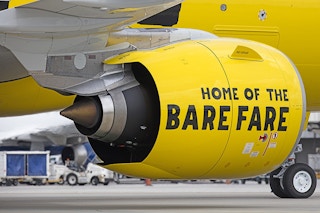
If saving money is your top priority, budget airlines can be your answer to how to find cheap flights as their base fares are typically lower. Breeze Airways, Spirit Airlines, and Frontier Airlines are a few of the most budget-friendly airlines in the U.S.
These airlines tend to offer the cheapest plane tickets (sometimes as low as $19 one-way), but you’ll usually miss out on other travel perks that make flying more enjoyable and the whole activity of traveling less stressful. Last-minute delays or flight cancellations are typically far more difficult to fix, and baggage fees are usually higher. You’ll also likely experience a no-frills flight without free Wi-Fi or in-flight entertainment. Basically, you pay for what you get.
But if your main concern is getting from point A to point B, booking with a budget airline is a great way to save.
7. Black Friday and Cyber Monday are two of the best times to score cheap flights.
With all the buzz around Black Friday and Cyber Monday sales , you hardly hear about all the best flight deals available around this time. But they’re out there.
Tons of airlines slash ticket prices on Black Friday and Cyber Monday, making those two shopping holidays some of the best times to score cheap flights. For instance, Alaska Airlines, Breeze Airways, Frontier, and JetBlue all had Cyber Monday flight deals in 2024.
Here are some of the best deals from 2024:
-
Frontier Airlines: One-way flights, as low as $19
-
Spirit Airlines: One-way flights, as low as $25
-
Alaska Airlines: One-way flights, as low as $49
-
Southwest Airlines: One-way flights, as low as $69
-
American Airlines: Up to 40% off select flights
-
JetBlue: Up to $750 off vacation packages
8. Book cheap (and even free) flights with a travel reward credit card.
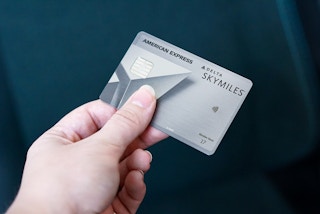
Using a travel reward card is probably the best and fastest way to score cheap flights on the reg. You can earn miles or points on everyday purchases and sometimes more on purchases you make with a certain airline.
Now, travel credit cards tend to have high interest rates — up to 20% higher than other credit cards. But if you’re good about paying off your balance on time, it can really help you save on flights.
If travel is a big part of your life, you’ll probably benefit from a high-reward credit card — one that helps you rack up points and miles the fastest but charges you an annual fee. A few of our favorites are the Capital One Venture Rewards Card ($95 / year), the Chase Sapphire Preferred Card ($95 / year) and the Alaska Airlines Credit Card ($95 / year).
9. Sign up for free airline rewards programs to earn points or miles toward flights.
You won’t earn miles nearly as fast as you would with a travel credit card, but it’s free to sign up for these loyalty programs, and sometimes you’ll even unlock special perks and savings when you hit certain thresholds. All that for $0 sounds good to me. I usually fly with Delta, American Airlines, or JetBlue, depending on who has the lowest prices for my route. So I’m signed up for all three of their rewards programs.
American Airlines AAdvantage
Earn miles when you fly on American Airlines and other participating airlines, including 1,000 partners. You can use your AAdvantage miles on flights to nearly 1,100 destinations worldwide, seat upgrades, vacation packages, car rentals, and hotels.
-
You’ll earn five miles per $1 spent, and miles never expire as long as you don’t go 24 months without earning or spending miles.
Delta Airlines SkyMiles
With Delta SkyMiles, you’ll earn miles for flying Delta Main Cabin or above and when you fly with 20 or more partners. You can use your miles for Delta flights, Delta vacation packages, seat upgrades, and premium drinks at Delta Sky Club.
-
You’ll earn five miles per $1 spent, and your miles never expire.
JetBlue TrueBlue
JetBlue TrueBlue gives you points when you fly with JetBlue and select partner airlines. You can use your points on JetBlue flights and Hawaiian Airlines flights, plus JetBlue vacation packages.
-
You’ll earn up to six points per $1 spent, and you can start redeeming benefits with as little as 500 points.
Southwest Rapid Rewards
With Southwest Rapid Rewards, you’ll earn points when you fly with Southwest or make purchases with their partners. You can then redeem your points for Southwest flights.
-
You’ll earn anywhere from six to 12 points per $1 spent, depending on the fare.
10. You’ll pay the most money for flights out of Washington, D.C., San Francisco, or Salt Lake City.
FinanceBuzz compared prices across the 45 busiest U.S. airports. The ones with the most expensive plane tickets were in Washington, D.C., San Francisco, and Salt Lake City. More specifically, these three airports had the highest average ticket prices:
-
Dulles International Airport in Washington, D.C., $488
-
San Francisco International Airport, $445
-
Salt Lake City Airport, $438
Sometimes you have to go where you have to go — so avoiding these airports isn’t always an option. But if you can, try to fly in or out of a different nearby airport in these areas. Here are the closest alternative airports in these three locations:
-
Washington D.C. — Ronald Reagan Washington National Airport (29 miles away)
-
San Francisco, CA — Oakland International Airport (31 miles away)
-
Provo, UT — Provo Airport (42 miles away)
11. Looking for a low-cost vacay? Florida airports tend to have the cheapest flights overall.
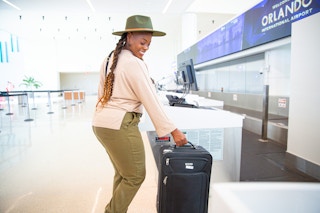
Florida is THE state to fly out of when it comes to the cheapest flights. FinanceBuzz found these two airports in Florida had some of the lowest average flight prices:
-
Orlando International Airport, $266
-
Fort Lauderdale Hollywood International Airport, $271
12. Search for flights out of multiple airports in your area to see which has the cheapest fares.
If you live in the vicinity of multiple airports, check for flights from ALL of them. Sometimes driving an extra hour or so to a different airport can save you money in the end.
13. Don’t forget to factor in baggage fees when you book your flight — some airlines charge more than others.
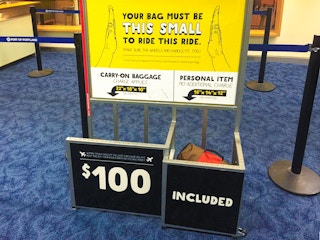
The worst thing is when you pay for a super cheap plane ticket and then get slammed with added fees afterward. Baggage fees can really add up, especially when checked bags and carry-ons aren’t built into the price of your ticket. If you learn one thing about how to find cheap flights, just know those extra fees should ALWAYS get factored into the equation.
Southwest has the absolute best baggage policy and the cheapest baggage fees — you get a free personal item, a carry-on bag, and two checked bags per ticket. Other airlines charge between $35 - $60 for your first checked bag and even more for your second. Here's a look at prices for your first and second checked bags at some other "budget" airlines:
-
Frontier: First Bag, $49 — Second Bag, $69
-
JetBlue: First Bag, $35 — Second Bag, $60
-
Spirit: First Bag, $69 — Second Bag, $89
14. Save even more on your flight when you pay with a discounted gift card.
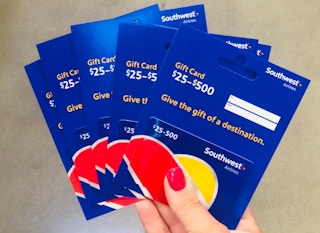
Buying discounted gift cards is one of my favorite ways to save at major retailers, but did you know you can buy them for airlines too?
It’s true — you can buy discounted gift cards online for Southwest, Delta, JetBlue, Frontier, and more airlines, and get up to 14% off the gift card value.
These gift cards are super popular and get snatched up quickly, so sometimes it’s hard to find them in stock.
You can find discounted airline gift cards on sites like GCX, CardBear, and Gift Card Granny and at stores like Costco.
15. Sign up for airline newsletters to get deals, promo codes, and coupons.
If you’re anything like me, your inbox can hardly handle another email subscription. But I promise — airline emails are worth the space they take up.
Southwest sends out promo codes weekly (yes, weekly) in their free email newsletter. Plus, you’ll get sale alerts, giveaways, and the occasional free drink coupon as a subscriber.
A few other emails worth signing up for:
-
Delta: Sign up for SkyMiles and get emails whenever Delta drops a special flash sale. These flash sales are deeply discounted international fares that other airlines simply can’t beat.
-
Frontier: Sign up for Frontier’s email newsletter for special offers and deals.
-
Spirit: Sign up for Spirit’s email newsletter for frequent coupon codes and deals.
16. Check for cheap flight deals and offers posted on the airline’s website.

Again, checking for flights directly with the airline is always a great way to start, especially if you can book a cheap flight through their online deals and offers.
If you have flexible travel dates, you’ll score some incredible prices on last-minute fares, travel packages, and one-way tickets to major U.S. destinations.
-
United: The United flight deals page is the clearance rack for United, where they’re trying to fill seats at a discounted rate.
-
Frontier: Visit Frontier’s online deals to see the latest deals and coupons available now.
-
JetBlue: Check JetBlue’s deals online to see if you can purchase a stellar deal before they sell out.
-
Delta: Head to Delta’s current flight deals online to browse a list of the cheapest round-trip tickets available from your airport.
-
Frontier: Watch for flights as low as $19 in Frontier’s online deals section.
17. Use free travel apps like Hopper to track ticket prices and find cheap flights.

There are TONS of different booking sites and travel apps out there, so it can be hard to weed through the crowd and find ones that truly work. I can personally tell you that Hopper (iOS / Android) is a must-have travel app.
Hopper uses a super smart algorithm to predict price drops (and price jumps) for different flights, telling you exactly the best time to book. You can also watch different flights and get alerts when the price drops.
The app even lets you freeze the price of a great flight deal you spotted. So when you find a low price and don’t want to lose it, you can freeze it to lock in the deal for a limited time. If the price gets even lower, you’ll pay less. If the price goes higher, Hopper will cover up to $300.
You can also book vacation homes, hotels, and car rentals through Hopper .
18. If you fly often, sign up for paid services like Going and JIFU to save more.

I’d rarely recommend paying for access to deals, but if you’re truly a frequent flyer, paid programs can actually help you save in the long run.
Going (formerly known as Scott’s Cheap Flights) works around the clock to find you the best deals on flights. Their experts hunt for flight deals 24/7 and deliver the best ones to you ASAP so you never miss an amazing fare. It’s free to sign up as a Limited member, but you can upgrade your plan for more benefits. A premium plan costs $49 a year, and an Elite Plan costs $199 a year. The Elite Plan gets you the best deals on first class, business class, or premium economy, which are priced much higher than your typical seat in coach. So if you travel for work, grabbing the best deals on these fares can really pay off.
JIFU (pronounced gee-foo ) offers their members discounts of up to 75% on hotels and huge savings on flights, cruises, and other travel purchases. It costs $25 a month to be a JIFU member, but you can try it free for 30 days (and you won’t even need a credit card to get started).
Related Reading:
Download the KCL app to add and redeem coupons in store

